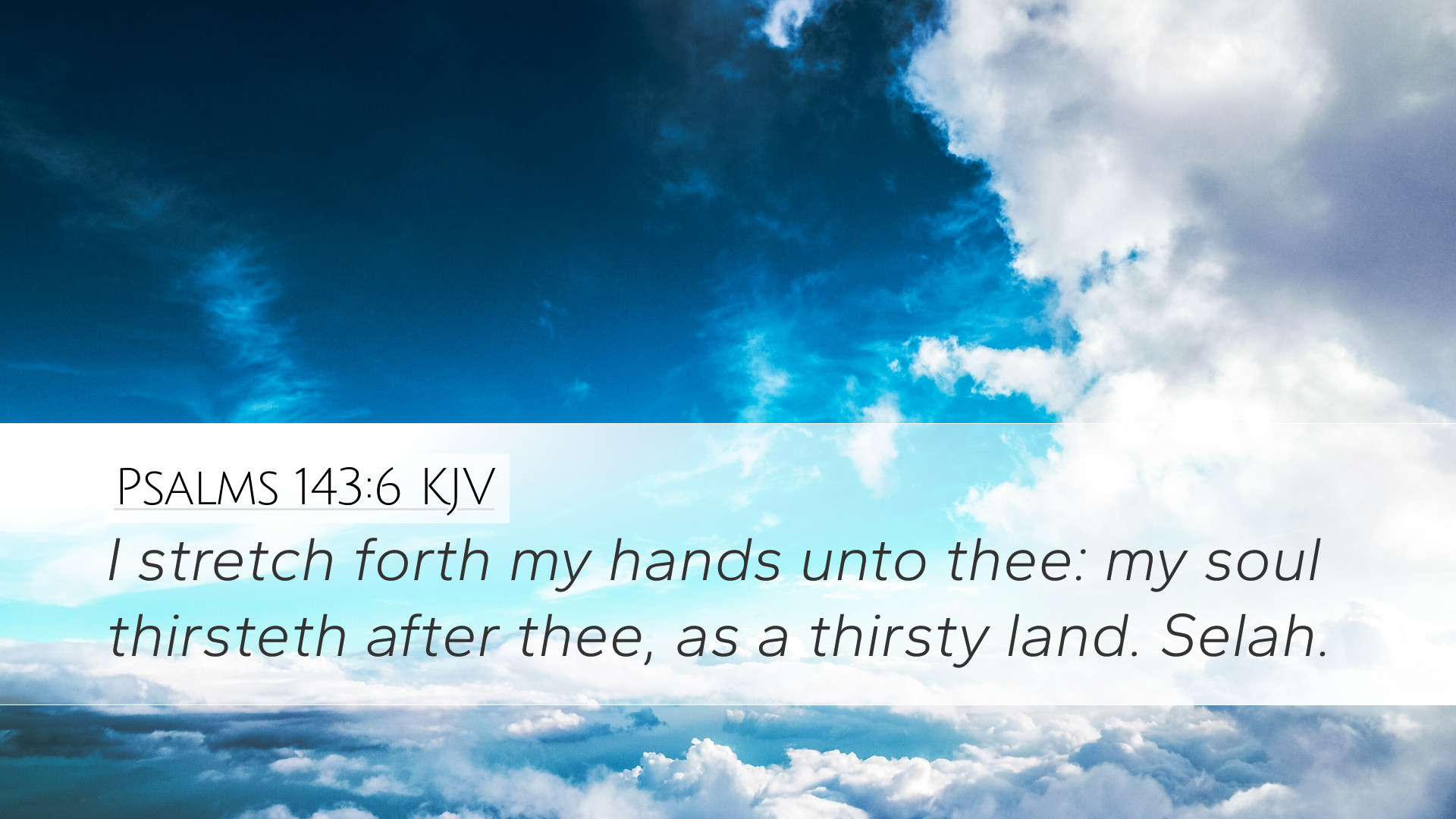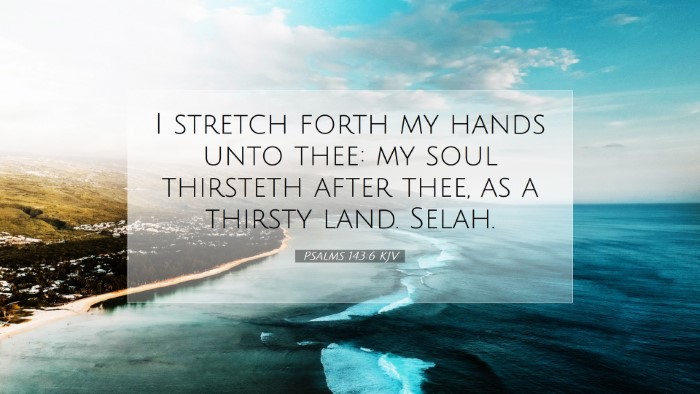Psalms 143:6 Commentary
Text of Psalms 143:6: "I stretch forth my hands unto thee: my soul thirsteth after thee, as a thirsty land." (KJV)
Introduction
Psalms 143 is a profound expression of desperation and longing for God amidst challenges and despair. In verse 6, the psalmist uses powerful imagery to convey a deep thirst for God, comparable to a parched land in need of rain. This commentary seeks to explore the themes present in this verse, drawing insights from public domain commentaries by Matthew Henry, Albert Barnes, and Adam Clarke.
Thirst for Divine Presence
Matthew Henry notes that the act of stretching forth one’s hands symbolizes a fervent plea and a posture of submission before God. When we think of hands being extended, it denotes a willingness to receive from God, much like a child reaching out to a parent. This imagery encapsulates the psalmist's deep need for divine intervention.
Additionally, Albert Barnes elaborates on this thirst, urging readers to understand that this isn’t merely a physical thirst but a spiritual thirst. The comparison to a 'thirsty land' highlights the depths of want and need; just as land cries out for water, the soul cries out for the refreshing presence of God.
The Nature of Spiritual Thirst
Adam Clarke emphasizes that spiritual thirst is integral to the believer's life. He states that when we genuinely seek and thirst after God, it reflects our awareness of our dependence upon Him. This longing is not only indicative of neediness but also of recognition that true fulfillment is found in God alone. Clarke asserts that such thirst is crucial in prayer, where the soul seeks communion with the divine.
This yearning for God is multifaceted. It can indicate a desire for guidance, comfort, and strength during tribulations. The psalmist’s despair is palpable, yet this verse transitions into a profound declaration of hope through the active pursuit of God’s presence.
The Symbolism of Hands and Land
Both Henry and Barnes point out the significance of the symbols used in this verse. The 'hands' signify human effort and longing, while 'thirsty land' represents desolation and need. The psalmist does not just passively await God’s help; instead, he actively reaches out, demonstrating an earnest desire for God's sustenance.
The notion of a 'thirsty land' also speaks to the barrenness of life without God. In the ancient Near Eastern context, land was heavily dependent on rain for agriculture and survival. When believers find themselves in spiritual drought, they are encouraged to turn towards God, who can provide refreshing streams of living water.
Theological Implications
From a theological perspective, this verse prompts a reflection on God’s nature as the sustainer and provider. Albert Barnes suggests that this verse can also be viewed in light of Christ’s teaching in John 7:37, where He invites the thirsty to come to Him and drink. This invites readers to recognize that Jesus fulfills the hungers and thirsts of humankind, reinforcing the belief that spiritual longing is met only in Him.
Application for Believers
This verse serves as a reflection point for pastors and Christians alike, prompting the essential question: What do we truly thirst for? Believers today are still called to stretch their hands toward God, acknowledging their dependency on Him in all aspects of life. Matthew Henry inspires readers to carry this attitude into daily prayer and worship, urging them to embrace their vulnerabilities as they confidently approach the throne of grace.
- Practical Reflection: Consider what areas of life feel parched or dry. In what ways can we position ourselves to receive God’s water?
- Spiritual Discipline: Incorporate times of prayer where one actively expresses their thirst for God, echoing the heart of the psalmist.
- Community Engagement: Encourage conversations about spiritual dryness within church communities, fostering an environment where collective longing for God is normalized.
Conclusion
Psalms 143:6 encapsulates a heart that is earnestly seeking God amidst turmoil. This yearning is characterized by an outward expression of reaching for the divine, paired with a deep spiritual thirst for intimacy with the Creator. As explored through the insights of Henry, Barnes, and Clarke, this verse encourages believers to recognize their need for God and to actively pursue Him, trusting in His provision in times of drought. The earnest plea of the psalmist remains relevant today, inviting us to stretch forth our hands to God and to thirst after Him as the ultimate source of fulfillment.


